Short sales, also known as REO (Real Estate Owned) properties are flooding the markets in all states and are a popular choice among investors and first time buyers. Whats the catch?
Lets first define what a short sale is. It is when a bank decides to sell a property below the mortgage owned on it and accepts to take a loss in order to save itself from dealing with a foreclosure.
Based on the price, they seem attractive and seem like the way to go especially since they have been flooding the market with as much as 48% of the listings in some states being strictly short sales. The catch however lays in the timing and execution of the deal, and in some cases in the condition of the homes. There is a red tape feel to the whole package.
In most cases, due to the amount of negotiations involved, the politics of who you know, and the numerous offers on the same home, it can take 3-4 months to close the deal, so don’t cancel your lease contract on your apartment just yet. With the bidding wars going on around the low advertised prices, and in some cases the REO agents ignoring all offers in order to low ball the property to a friend. The frustration can continue to grow as the uncertainty of the process continues to the very end.
The other problem is around the foreign investors buying all these properties as investments in cash, making for a large profit in the next 2-3 years. All these issues create a very dynamic market for buyers and prices seem low but go back to normal by the time you go to closing.
REO are priced to move quickly so that they don’t pile up and create a hassle for the banks.
This part of the market is working as we economists argue it should: lower prices increase sales. But the short-sale component of inventory defies this logic: A desperate would-be short seller could list a house for 30 percent below comparable properties, but the combination of red tape, overwhelmed and understaffed loss mitigation departments at the lenders, and misconceptions about what’s needed to get the sale approved mean the house doesn’t sell any faster, if it sells at all.
So it doesnt always make sense to buy a short sale at a significant saving as the house will not be in the right condition, the deal will take forever and the hassle will drive you crazy.
Predicting where the market will go is almost impossible as this dynamic short sale market continues to grow and creates uncertainty in home prices nationwide. Fanny Mae did note that it tightened its guidelines in 2007, which means that defaults should occur within 3 years, meaning early 2010 might be the end of major losses and the start of a modest recovery around homes.
The only problem again will be the indigestion of all of these short sales.
